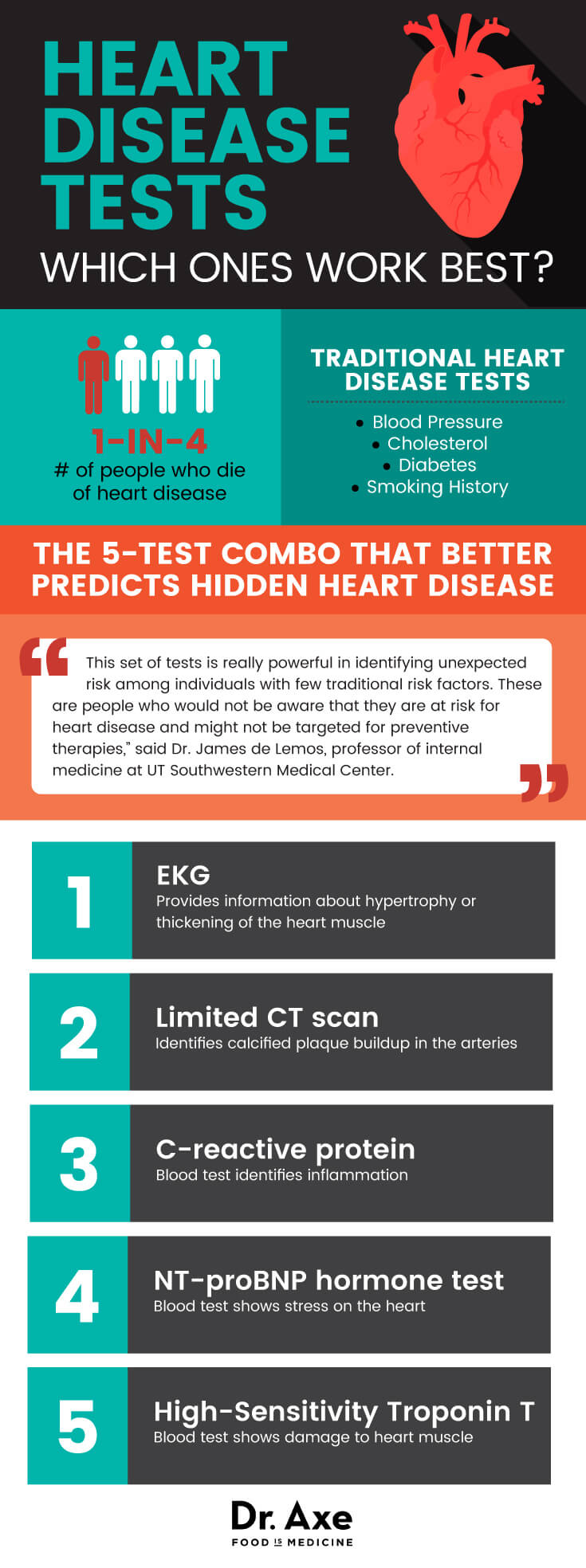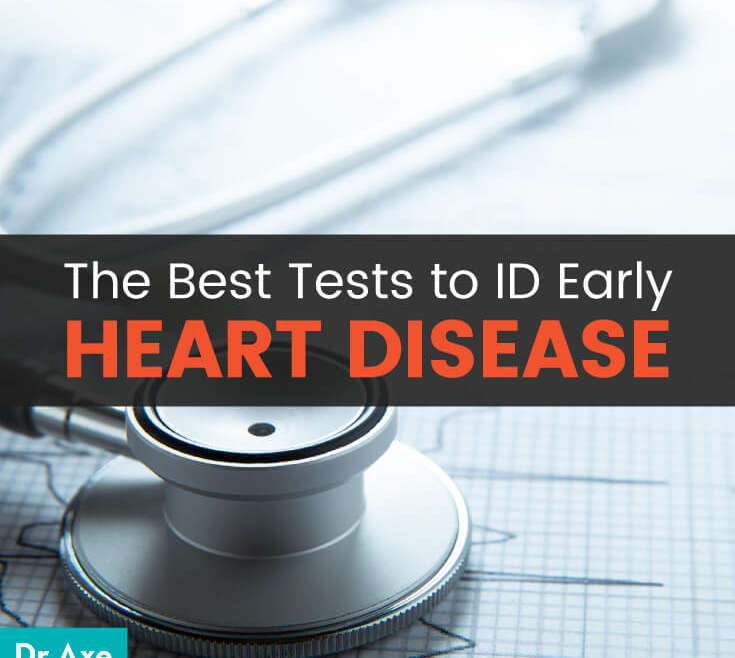Heart disease tests are important. After all, heart disease kills 610,000 people in the United States every year. That’s one in every four deaths, making it the leading cause of death for both men and women. High blood pressure, high cholesterol, smoking, diabetes, obesity, poor diet, physical inactivity and excessive alcohol use all contribute to this life-threatening disease. But what if we could better predict heart disease? The hundreds of thousands of Americans losing their lives to heart disease could better prepare to fight the illness and increase their longevity.
Heart Disease Tests: This 5-Test Combination Is Best
The standard for predicting heart disease today revolves around blood pressure, cholesterol, diabetes and smoking history. Now, it seems there are five simple tests — an EKG, a limited CT scan, and three blood tests — that can help medical professionals better understand who is at risk for developing heart disease (2).
- The EKG test provides information about hypertrophy, or thickening of the heart muscle.
- The limited CT scan identifies calcified plaque buildup in the arteries.
- A blood test for C-reactive protein indicates inflammation.
- A blood test for the hormone NT-proBNP shows stress on the heart.
- High-sensitivity troponin T shows damage to heart muscle can also be shown through a blood test.

Hospitals regularly use troponin testing to diagnose heart attacks, but a high-sensitivity test can detect small amounts of damage in individuals without any symptoms of heart disease. High-sensitivity troponin T tests are not readily available, but they will be soon. The other four tests are. This set of tests not only improves doctors’ abilities to predict heart attacks and strokes, but it also enables doctors to predict heart failure and atrial fibrillation, making it a strong combination of tests to predict heart trouble.
Other Strange Predictors of Ticker Trouble
Wondering if you should take these tests and get tested for cardiovascular disease? There are a number of other lesser-known predictors of ticker trouble that may urge you to get tested. Four strange signs you may be at risk for heart disease include:
1. Where you live
According to a 2001 study published in The New England Journal of Medicine, people living in lower-income neighborhoods were more likely to have heart disease than those with similar incomes living in wealthier communities. (3) It’s important to note that because similar incomes were compared across neighborhoods, these results cannot be attributed to personal socioeconomic status, but the features of the neighborhoods themselves. These unequal exposures serve as just one example of environmental injustice
. 
2. A creased earlobe
According to several studies, a diagonal crease in either or both of your earlobes could be a sign of heart trouble. This earlobe crease has now been coined “Frank’s Sign.” Arthur Friedlander, DMD and professor of oral and facial surgery at UCLA, explains that this bilateral crease can potentially predict heart trouble because the earlobe is the terminal point for many blood vessels, meaning if blood circulation blockages are occurring, they may show up as wrinkles in your lobes.
3. Your grip strength
Researchers identified a possible connection between lower muscular strength measured by grip strength and an increased risk of death due to heart disease. The study used a device called a dynamometer to measure. Each 11-pound decrease in strength during the study was linked to a 17 percent higher risk of dying from heart disease, a 9 percent higher risk of stroke, a 7 percent higher risk of heart attack and even a 16 percent higher risk of dying from any cause. Fortunately, testing grip strength could prove to be a very simple, inexpensive way to preemptively test for heart trouble and overall health. However, further research is needed to test whether improvement in strength reduces the risk of heart disease.
4. Whether you eat breakfast
According to a 2017 statement by the American Heart Association, a link may exist between eating breakfast and having a lower risk of heart disease. Why? Studies show that people who eat breakfast daily are less likely to have high cholesterol and/or blood pressure. Unfortunately, 20 to 30 percent of U.S. adults skip breakfast. Start your morning off right with healthy fats and protein and avoid sugar-filled breakfasts.
Other Natural Ways to Keep Your Heart Healthy
These tests are helpful and worth taking, but regardless of the results, we have to be proactive to keep our hearts healthy. To optimize your heart health:
Exercise.
Exercise helps manage hormones and blood sugar levels, helping you relax and feel happy. Try whichever type of workout fits your personality and current fitness level best. It could be anything as gentle as walking or yoga to as intense as burst training or HIIT workouts.
Eat a healthy diet full of anti-inflammatory foods.
Add fiber-rich and antioxidant-rich foods, vegetables, fruits (especially berries and citrus fruits), herbs and spices (especially turmeric and raw garlic), teas such as green tea, oolong or white tea, legumes and beans, healthy fats (nuts, seeds, avocados, wild-caught fish, coconut oil and extra virgin olive oil) and raw, unpasteurized dairy products, cage-free eggs and pasture-raised poultry to your diet.
Avoid chemicals and toxins.
Researchers illustrated a potential link between the chemical BPA, which is often found in canned foods and drinks, and heart disease. In 2011, scientists found BPA changed the natural heartbeat signaling in female rats. This led to arrhythmia, an erratic beating that sometimes causes sudden cardiac death. (7)
Reduce stress.
Some of the best ways to bust stress include quitting caffeine, smoking and alcohol. Getting enough sleep and proper rest, praying and/or meditating, journaling, expressing your creativity and spending time with your loved ones, whether that be family, friends or pets can also really help protect your heart. And remember, exercising is another great way to reduce stress!
Final Thoughts on New Heart Disease Tests
- The combination of an EKG, a limited CT scan, and three blood tests not only improves our ability to predict heart attacks and strokes, but it also enables doctors to predict heart failure and atrial fibrillation.
- Factors such as where you live, how tall you are, whether you eat breakfast and how strong of a grip you have could possibly predict your risk of heart disease.
- By exercising, eating a healthy diet, avoiding chemicals and reducing stress, you can reduce your likelihood of developing heart troubles.



